Human Rights
Human Rights Management System
Policy
SK Gas respects the human rights of all stakeholders, including members, shareholders and investors, business associates, customers, local communities, and the environment. To reflect this commitment across all aspects of its management, SK Gas has publicly announced a Human Rights Declaration under the CEO's name, adhering to global human rights guidelines*. The SK Gas Human Rights Declaration includes principles of respect for human rights, prohibition of discrimination, prohibition of forced labor, prohibition of child labor, compliance with working hours and working conditions, freedom of association, workplace health and safety and environment, and protection of the human rights of local residents. It encompasses the protection of human rights for not only employees but also all stakeholders.
The CEO has established Human Rights Management Regulations to organize a governance and working-level structure responsible for human rights management, identifies human rights risks through periodic human rights impact assessments, and selects and implements improvement tasks to prevent and mitigate identified risks. In particular, SK Gas understands and respects the perspectives of stakeholders with diverse economic, social, and cultural backgrounds and pays close attention to ensuring that human rights are not infringed upon during business processes and that no one is excluded or discriminated against in decision-making.
- * Universal Declaration of Human Rights, International Bill of Rights, UN Guiding Principles on Business and Human Rights, International Labor Organization, OECD Guidelines for Multinational Enterprises, International human rights principles, including the UN Convention on the Rights of the Child
Scope and Process of Human Rights Management
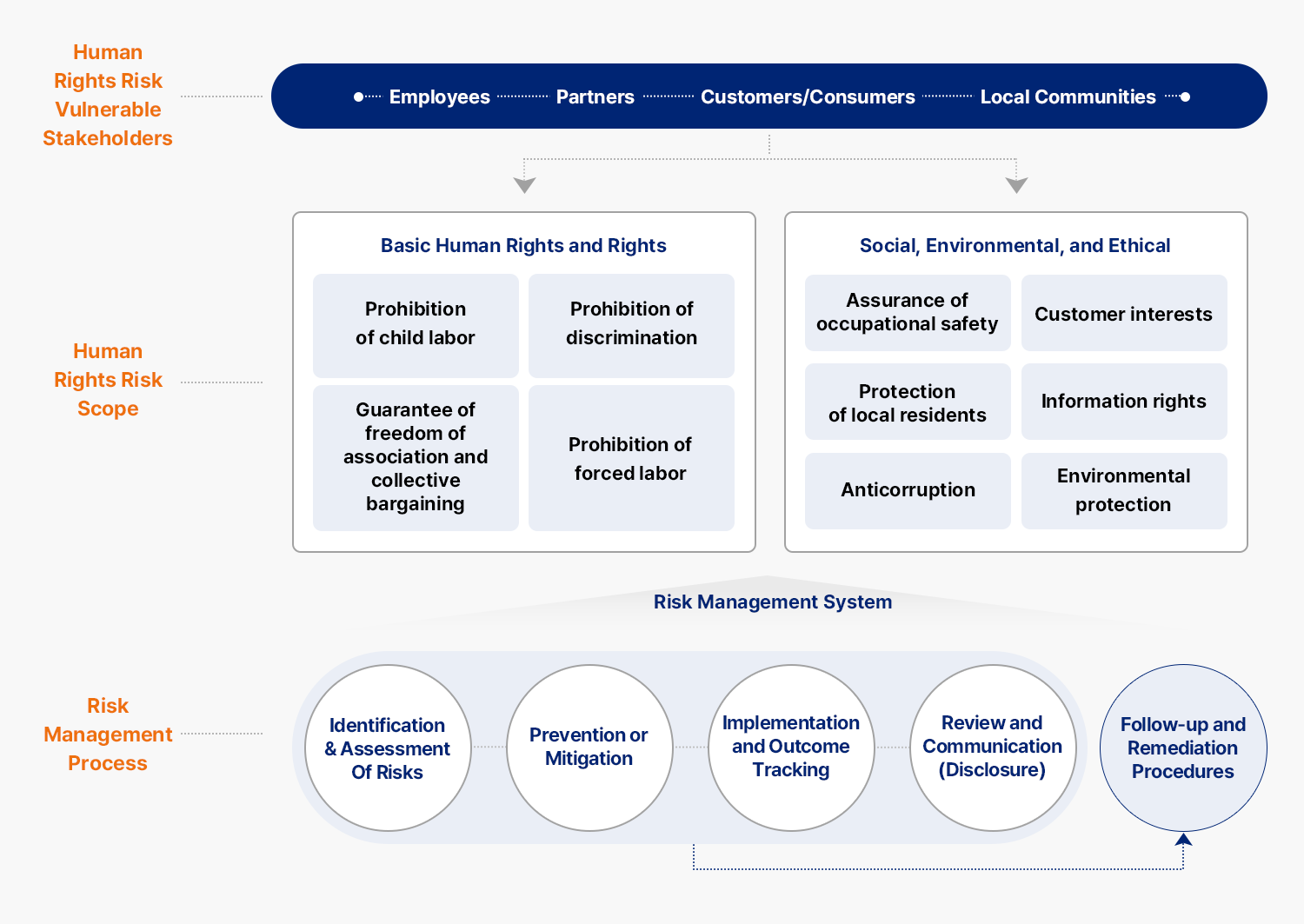
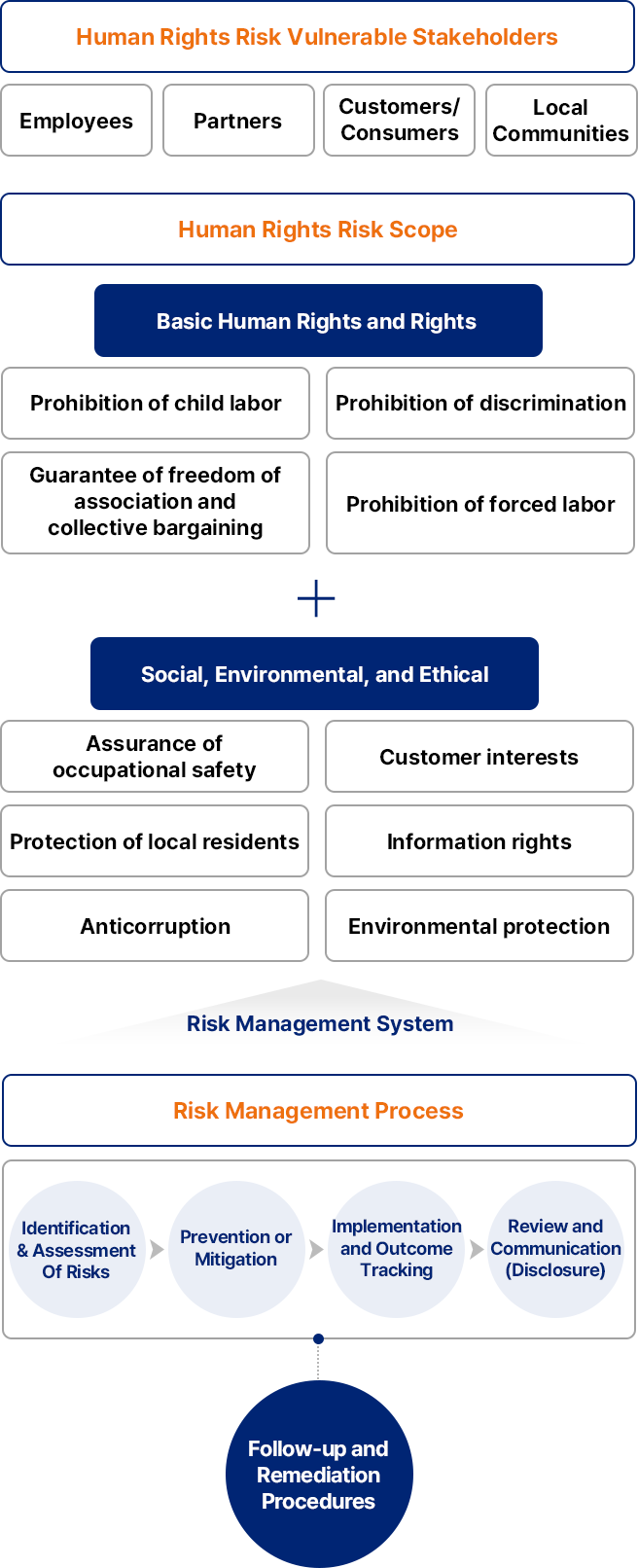
Target
- Employees
- Partners
- Customers/Consumers
- Local Communities
Scope
- Basic Rights
- Prohibition of child labor
- Prohibition of forced labor
- Freedom of association and collective bargaining
- Non-discrimination
- Social, Environmental, and Ethical
- Guarantee of industrial safety
- Environmental protection
- Protection of local residents
- Anti-corruption
- Customer benefits
- Information rights
Management Process
-
Risk Management System
- Identification and evaluation of risks
- Prevention or mitigation
- Execution and result tracking
- Review and communication (disclosure)
- Follow-up actions and remediation procedures
Metrics
Since introducing human rights management in 2019, SK Gas has been establishing a human rights management system and enhancing its human rights impact assessment framework according to a mid-term roadmap, with the ultimate goal of embedding a culture of respect for human rights within the company. To this end, SK Gas conducts regular human rights management training for employees and operates a human rights grievance counseling/reporting channel. The results of these human rights education and grievance channel operations are disclosed annually.

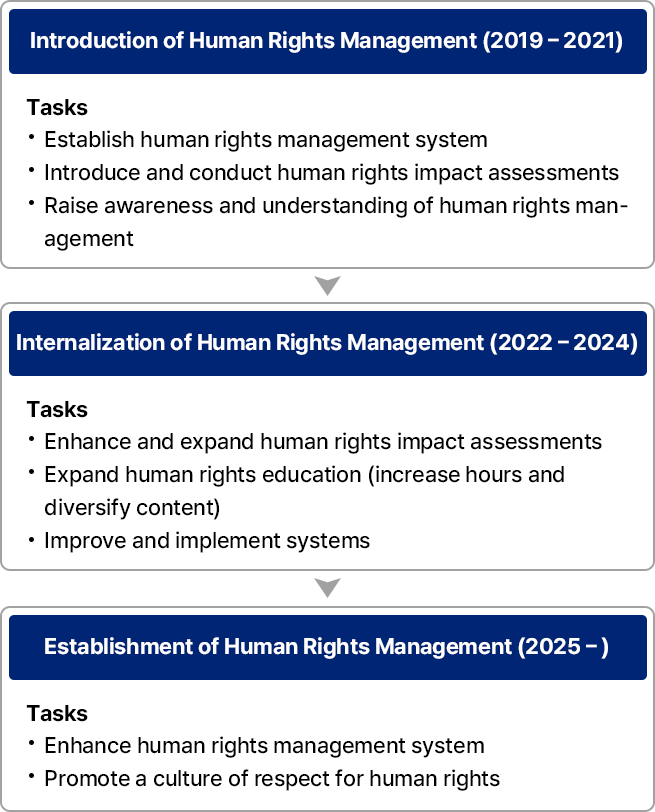
-
Introduction of Human Rights Management (2019 ~ 2021)
- Tasks
- Establish human rights management system
- Introduce and conduct human rights impact assessments
- Raise awareness and understanding of human rights management
-
Internalization of Human Rights Management (2022 ~ 2024)
- Tasks
- Enhance and expand human rights impact assessments
- Expand human rights education (increase hours and diversify content)
- Improve and implement systems
-
Establishment of Human Rights Management (2025 ~ )
- Tasks
- Enhance human rights management system
- Promote a culture of respect for human rights
Governance
SK Gas has established a 'Human Rights Management Committee' under the CEO to manage the effective protection of the human rights of employees, business associates, customers/consumers, and the local community. The company conducts a human rights impact assessment annually and reports the results to the ESG Committee under the Board of Directors. The Human Rights Management Committee has a secretariat that oversees company-wide human rights management and selects chief human rights officers for each stakeholder group to establish human rights management systems for those stakeholders and manage human rights issues. Furthermore, organizations such as HR and SHE (Health and Safety, Environment), Legal Affairs, and Audit participate in the committee to provide functional working-level support.
Organization Chart
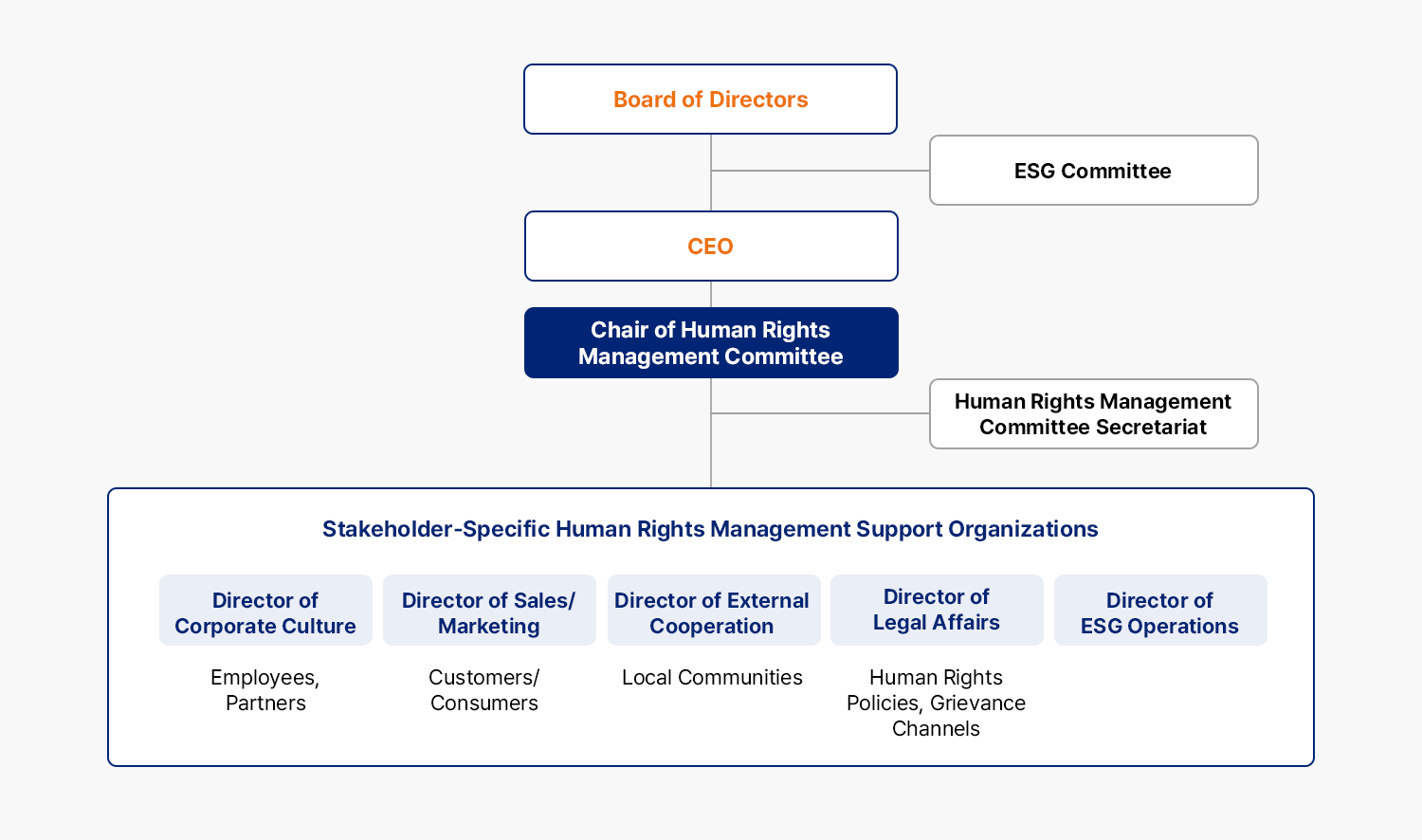
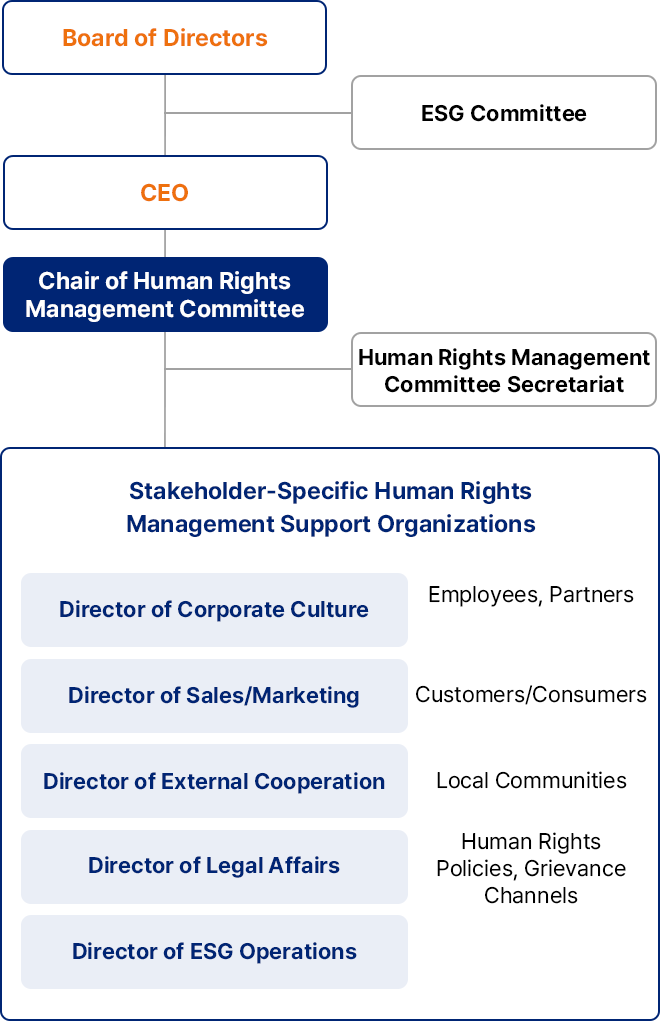
- Board of Directors
- ESG Committee
- CEO
- Human Rights Management Committee Chairperson
- Human Rights Management Committee Secretariat
-
- Stakeholder-specific Human Rights Management Oversight/Support
- Corporate Culture Director: Employees, Partners
- Sales/Marketing Director: Customers/Consumers
- External Relations Director: Local Communities
- Legal Director: Human Rights Policy, Grievance Channels
- ESG Operations Director
Human Rights Protection Strategies
Human Rights Impact Assessment
A human rights impact assessment is the process by which a company identifies all potential negative human rights impacts it may have on stakeholders, assesses their severity and likelihood of occurrence to prioritize key human rights issues requiring response, and establishes action plans to mitigate or prevent them. SK Gas has adopted a human rights impact assessment framework that aligns with international standards, such as the UN Guiding Principles on Business and Human Rights (UNGPs) and the OECD Guidelines for Multinational Enterprises on responsible business conduct, and conducts human rights impact assessments regularly every year.
Human Rights Impact Assessment Process
-
Step 1
Planning
-
Assessment Design and Training
- Defining assessment scope, target, and methods
- Identifying training targets
- Business Environment Analysis
- Identification of Existing Human Rights Risks
- Selecting Human Rights Risks
-
-
Step 2
Identification of Human Rights Impacts
- Checklist
- Self-assessment questionnaires
- Surveys
- Site visits, and focus group interviews (FGI)
- Identifying actual/ potential human rights impacts
-
Step 3
Human Rights Impact Assessment (HRIA)
- Determining HRIA Scale
- Severity assessment
- Priority assessment
-
Step 4
Response Measures
- Mitigation/prevention response actions
- Establishment of functional mitigation/ prevention tasks
- Preparing HRIA Report
-
Step 5
Enhancing the Human Rights Due Diligence System- Improving human rights policies
- Developing monitoring plans
- Developing communication plans
- Evaluating and improving grievance handling effectiveness
Identifying and Assessing Human Rights Impacts
SK Gas strives to identify all potential negative human rights impacts on stakeholders, considering the company's business value chain. By referencing international standards such as the UNGPs and OECD guidelines, SK Gas assesses the priority of human rights issues based on their severity and likelihood of occurrence, and issues rated at level 4 or higher are selected as key human rights issues. Detailed information regarding the human rights impact assessment is disclosed annually through the Sustainability Report.
Evaluation Criteria

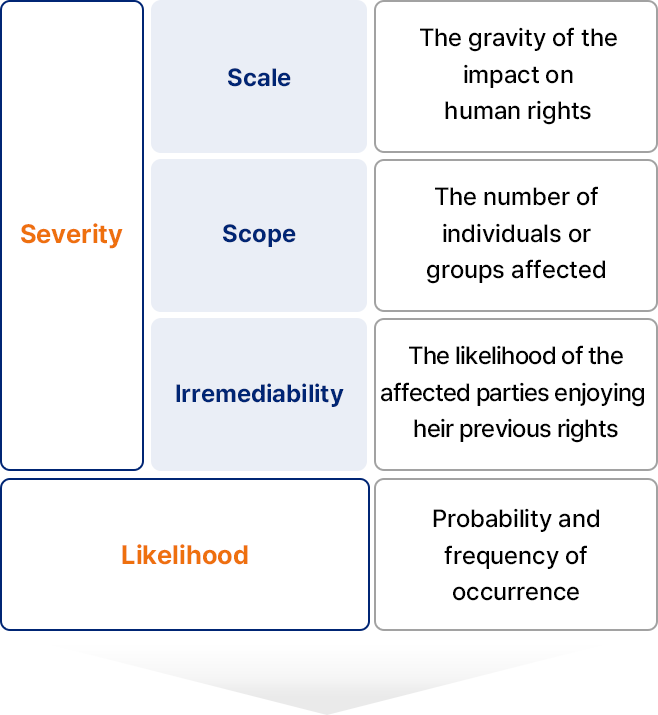
-
Severity
- Scale: The gravity of the impact on human rights
- Scope: The number of individuals or groups affected
- Irremediability: The likelihood of the affected parties enjoying their previous rights
- Likelihood: Probability and frequency of occurrence
Priority Evaluation Table

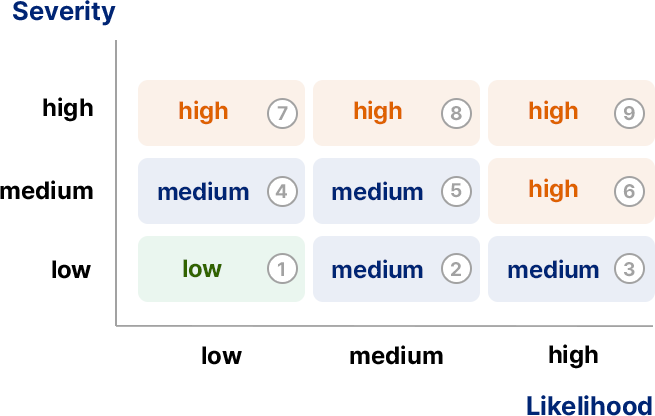
"If the company cannot address all negative human rights impacts at once, it should start with the most severe impacts." (UNGPs, Commentary on Principle 24)
Metrics
Preventive Management of Human Rights Risks
Through its human rights impact assessment, SK gas continuously supplements its human rights management system while identifying, preventing, and mitigating potential human rights risks. To achieve this, we select vulnerable groups for each risk, derive mitigation and prevention measures, reflect them as improvement tasks for implementation, and conduct human rights infringement prevention programs and education to raise awareness of human rights among our organization members
| Category | Group | Action Plan |
|---|---|---|
| Prevention of Sexual Harassment | All Employees |
|
| Prevention of Workplace Bullying | All Employees |
|
| Anti-discrimination / Protection of Rights of Disabled Persons | Employees with Disabilities |
|
- * Human rights grievance channels include integrated reporting channels for issues such as sexual harassment prevention and workplace bullying (since 2021).
Human Rights Grievance Counseling Channels
SK gas operates various channels to address human rights-related grievances from stakeholders, including its members. We designate departments for the investigation and handling of received issues and actively resolve problems through fair procedures. Throughout this entire process, the protection of the reporter is recognized and managed as the most critical element.
Human rights grievance counseling and reporting channels for each stakeholder
| Stakeholder | Online | Offline |
|---|---|---|
| Employees |
|
|
| Partners |
|
|
| Customers |
|
|
| Local Communities |
|
Diversity
Based on its human rights management policy, SK Gas protects the rights of employees and respects diversity by preventing discrimination in employment, promotion, compensation, and working conditions based on origin, race, gender, disability, religion, age, political opinion, and other factors. To maintain this commitment, SK Gas conducts annual discrimination prevention education, including disability awareness training, and expands the hiring of female leaders and employees with disabilities. The status of SK Gas employees by employment type, rank, and the number of female, disabled, and foreign employees can be found through the link below.
The status of SK Gas employees by employment type, rank, and the number of female, disabled, and foreign employees can be found through the link below.
